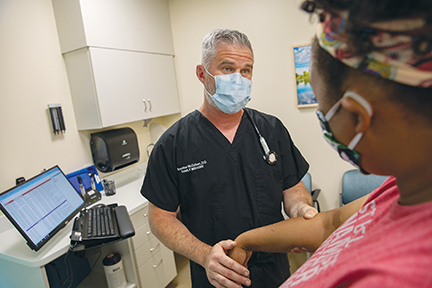By LISA EISENHAUER
One of the benefits of a new collaboration between Mercy and Mayo Clinic will be to advance both systems' efforts to provide proactive care, says Dr. John Mohart, president of Mercy communities.

Mohart
Mohart leads operations for the more than 40 hospitals within the four-state Mercy system, which is based in St. Louis.
"In health care, we've always been so reactive, waiting for patients with symptoms or problems to visit us, but we know the future is to be more proactive," Mohart explains. "With this, we can have more of the approach where we detect disease earlier, find it and treat it and get better outcomes for patients."
Under the 10-year agreement the system signed in July with the Mayo Clinic, deidentified patient data from Mercy hospitals and clinics will be accessible as will similar data from Mayo Clinic for clinicians to mine for information about treatments and outcomes.
The data from Mercy covers more than 500 million patient encounters from the diverse populations the system serves in Missouri, Arkansas, Kansas and Oklahoma, Mohart says. The data goes back 14 years to when Mercy was one of the first adopters of an electronic medical records system. Mayo Clinic uses the same records system, which is Epic.

Under the new pact between Mercy and Mayo Clinic that aims to advance care, Dr. Brendon McCollom, a Mercy family practitioner in Oklahoma, and other clinicians will have access to each system's clinical data.
Mohart says Mercy's data will complement Mayo Clinic's, which comes mostly from specialty and highly complex care. "It is to combine our resources to elevate both of us, but really for the common good," he says of the partnership.
The nonprofit Mayo Clinic is based in Rochester, Minnesota. It has major campuses in Scottsdale and Phoenix, Arizona, and Jacksonville, Florida, and dozens of smaller locations in several states.
Technological innovations — including in cloud-based architecture, artificial intelligence and machine learning — have made it possible to explore Mercy's and Mayo Clinic's clinical data without that data being extracted or transferred between the systems and to do so in real time, Mohart says.
He explains that the research will help develop algorithms that lead to earlier detection of illness, new treatment pathways and best practices for clinicians.
For example, Mohart, who is a cardiologist, says the distributed data platform the collaboration is creating would allow him to search Mercy and Mayo Clinic records for cases involving rare conditions as a guide to what treatments hold the most promise.
Mohart says the data partnership could pave the way for other joint efforts between Mercy and Mayo Clinic. "Certainly, as we learn to work together and develop these care paths, I expect we will continue to form other collaborations," he says.
He adds that while there are no immediate plans to share or sell access to the data platform beyond Mercy or Mayo Clinic, the findings from research based on the platform are expected to advance the state of medical care in general.